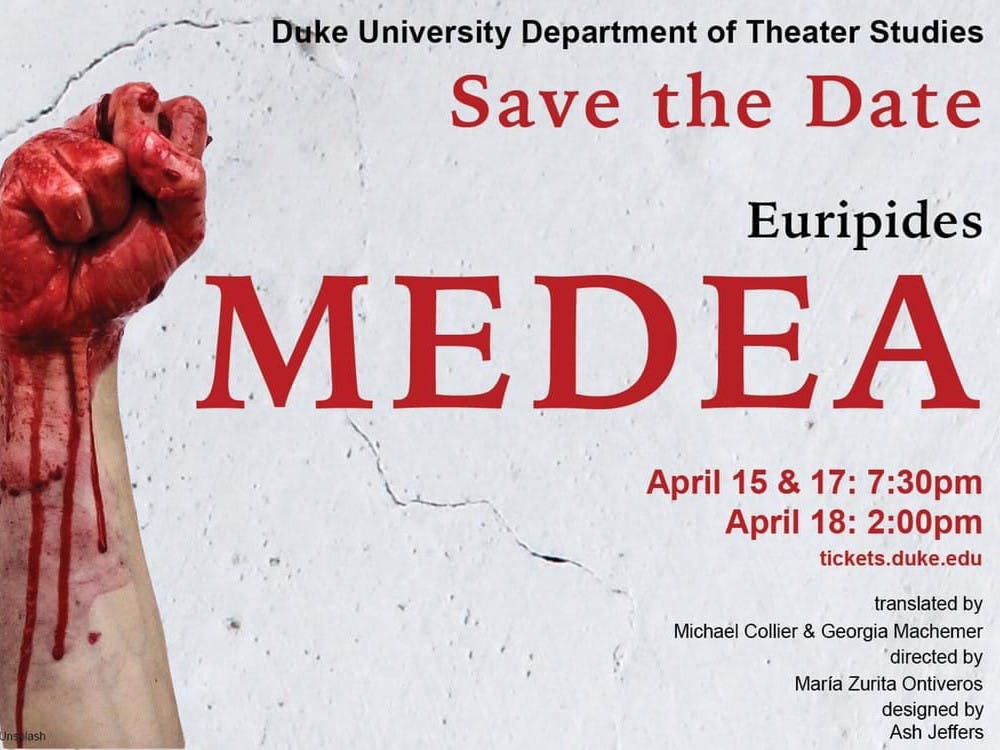Murder. Mythology. Mainstage. For anyone who isn’t aware, “Medea” is an ancient Greek tragedy written by Euripedes. Here’s a behind-the-scenes look into the joint senior distinction project that made its way to a Duke Theater Studies Spring Mainstage production.
The play will be performed live and live streamed to virtual audiences in Reynolds Industries Theater on April 15 and 17 at 7:30 p.m. and April 18 at 2:00 p.m. The production is a culmination of months of hard work from the cast and production crew. Audiences next week will have two seniors to thank for the show’s idea and design.
María Zurita Ontiveros, senior and director of “Medea,” and Ash Jeffers, senior and designer for the play, both desired to pursue distinction projects within the Theater Studies Department. Having a class together their junior year sparked conversations around working together, and they haven’t looked back since.
“I knew I wanted to direct ‘Medea’ since the end of my sophomore year, and that I’d probably present it as a thesis project to the Theater Studies Department,” Zurita Ontiveros wrote in an email. “Ash and I were in a class together junior spring, and they told me they wanted to do a distinction project on design. The idea sort of came around of ‘what if we do this together,’ and the department thought it was a great idea.”
Within Theater Studies, the distinction program works with students interested in completing a project in writing, directing, design, acting, literature, history or theory. As with several previous distinction projects, “Medea” was set to be a Duke Players show, which would have been almost entirely student-produced.
“We applied for a joint distinction project operating under that assumption [that it would be a Duke Players show],” Jeffers wrote in an email. “[A]nd it was only after COVID happened that the show transformed into a Mainstage thanks to Theater Studies’ schedule rearrangements and advocacy for our project from within the department.”
As with many activities and events at Duke, the COVID-19 pandemic has significantly changed how we interact with one another. Fortunately, the production team was able to not only collaborate virtually through Zoom calls, emails and texts, but also incorporate the production’s virtual aspect into the performance.
“Everything the audience sees in the livestream is being captured by the actors in the Chorus onstage, and it’s required an immense amount of work from Austin, our video designer, Anya, my assistant director, and all our camera operators,” Zurita Ontiveros wrote. “We went from ‘we need someone to film the staging to show it to an audience’ to making it a core aspect of the concept, which I’m very excited by.”
For Jeffers, the design process also followed social distancing protocols, which meant that most of the early design collaboration occurred online by sending 3D model drafts and several versions of the set. This semester, Jeffers worked in-person at the Bryan Center with the build team to construct the set, and they found “Medea” to be one of their most collaborative show experiences.
“‘Medea’ is the first show that I have seen all the way through as a designer from first concept to completion.” Jeffers wrote. “As such, I had never collaborated with a director, other designers or a technical director so closely before.”
Zurita Ontiveros hopes to share a message that is relatable to many people, especially during the COVID pandemic. Injustice, grief and loss are themes felt by everyone, and “Medea” will tackle these experiences in ways challenging yet rewarding.
“Medea shows a story of someone who is pushed to the very edge because of her circumstances — she has destroyed her family and chance to go back to her home country for a man who then abandons her,” Zurita Ontiveros wrote. “There is something captivating about her story, and so I hope that ‘Medea’ reminds us all that we aren’t alone in feeling these things.”
Student-led projects like “Medea” showcase the talent and creativity of students as well as the countless opportunities found in Theater Studies. Whether it’s designing, directing or getting involved in any part of production and performance, Theater Studies is a department filled with students and faculty willing to offer advice and guidance for students at any experience level.
“I do think it’s [‘Medea’] reviving a thrilling tradition,” Zurita Ontiveros wrote. “I hope more students in the future feel comfortable pitching their ideas to the department because directing a Mainstage is an opportunity like no other.”
For students thinking about doing a similar senior project of their own, it’s important to note that it’s not an isolating process. There is bound to be some doubt and confusion, but reaching out, asking for help and working with other people make distinction projects rewarding.
“Find a partner and/or mentor that you are excited to work with, that challenge you and make you think about things in a way that you haven’t before,” Jeffers wrote. “Theater is a fundamentally collaborative artform, so naturally, having collaborators you trust and respect is a great first step.”
Both students noted how crucial Theater Operations staff were to making “Medea,” and how resilient their entire team was since the pandemic shut down much of Duke. They agreed that this production wouldn’t be possible without the people dedicated to helping students make art while keeping everyone safe.
“They are the unsung heroes of the performing arts at Duke,” Jeffers wrote. “Theater Operations’ dedication to students, the performing arts and arts education is a gift to Duke, to the student body and to me.”
For an in-depth look at Jeffers’ and Zurita Ontiveros’ theater journey, check out their interview with Duke Arts.
Get The Chronicle straight to your inbox
Signup for our weekly newsletter. Cancel at any time.

